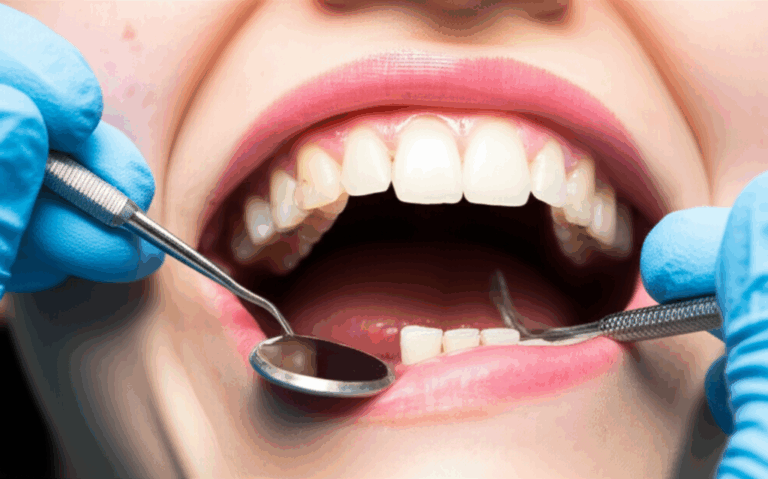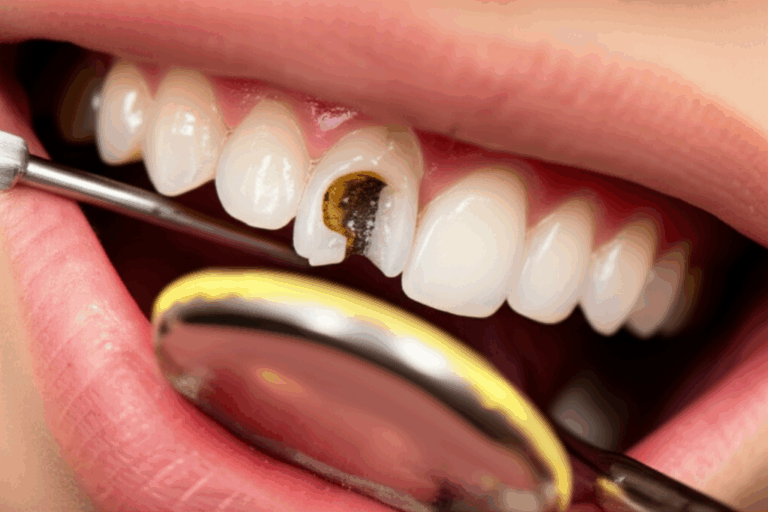
Can a Dentist Remove Tonsil Stones?
Your Friendly Guide to Professional Removal & Relief
We’ve all dealt with bad breath or a sore throat now and then. But if you’ve noticed small, white bumps at the back of your throat—maybe they smell terrible and are tough to get rid of—you’re probably wondering: “Will a dentist remove my tonsil stones, or do I need to see someone else?” If that question’s been nagging at you, take a breath. You’re definitely not alone.
Tonsil stones, also known as tonsilloliths, are a lot more common than you might think. While they’re usually not dangerous, they sure can be unpleasant—and embarrassing. If you’re looking for clear, non-scary answers and simple advice, you’ve come to the right place. Let’s break it all down in plain words to help you know your choices and get you feeling fresher and more comfortable.
In This Article: What We’ll Cover
- What Are Tonsil Stones?
- Can Dentists Remove Tonsil Stones?
- How Dentists Can Help with Tonsil Stones
- When to See an ENT Specialist
- Professional Tonsil Stone Removal Procedures
- At-Home Care and Prevention Tips
- When Is It Time for Urgent Medical Help?
- Costs and Insurance: What to Expect
- Your Healthy Takeaway
What Are Tonsil Stones? (And Why Do They Happen to Me?)
Ever noticed tiny, smelly, white lumps on your tonsils? You’re probably looking at a tonsil stone. Let’s put it in simple words.
Tonsil stones (“tonsilloliths”) are small, hard groups that build up in the little pockets—think “caves” or “holes”—in your tonsils (those bumpy bits at the back of your throat). They’re made from old food bits, germs, dead cells, and spit that get stuck. After a while, they get hard and look like white or yellow dots—sometimes as tiny as a grain of rice, sometimes bigger.
Why Do Tonsil Stones Exist?
Your tonsils work a bit like security guards, catching germs and junk before it goes down your throat. But those same pockets can trap all sorts of stuff. When leftover food, spit, dead cells, and germs get stuck in there, your body tries to clean it out, which can lead to stone build-up. They can harden from calcium and start to stink, mostly because germs inside them make smelly sulfur stuff. That’s why your breath can get really bad if you have them.
What Do Tonsil Stones Feel Like?
- Stubborn bad breath (even after brushing and rinsing)
- Sore or scratchy throat
- The feeling something’s stuck in your throat
- Trouble swallowing
- Sometimes, ear pain
Did You Know?
Up to 10% of adults have tonsil stones at some point, but lots never even know it. If you’re someone who’s got lots of “holes” (deep pockets) in their tonsils, or you often get sore throats, you’re more likely to get tonsil stones.
Can Dentists Remove Tonsil Stones?
Here’s the easy, direct answer: Yes, a dentist can take out some tonsil stones—but not all, and it depends on what kind you have.
Dentists are often the first to spot tonsil stones, especially during regular cleanings if you mention bad breath. But their job is a bit like a helper: sometimes they’ll fix the problem right away, sometimes they’ll tell you to see another expert.
When Will a Dentist Remove Tonsil Stones?
- If the stones are small and easy to see (close to the surface)
- If you mention bad breath and the dentist spots stones during a check
- As part of a dental visit when trying to figure out why you have bad breath
But here’s the catch:
Dentists can’t (and shouldn’t) remove deep or big tonsil stones. That’s really for a different kind of doctor. For tougher, stubborn, or painful cases, an ENT doctor (Ear, Nose & Throat specialist) is the expert to see.
How Dentists Can Help with Tonsil Stones
Think of your dentist as your first stop for relief. They can do more than just say you have a problem—often, they can get you started with quick fixes, and when needed, a plan for what to do next.
1. Diagnosis and Discovery
Lots of people find out they have tonsil stones during a normal dental visit. Dentists are always checking for reasons for bad breath or signs of problems in your mouth, and tonsil stones are pretty easy for them to spot with their mirror and light.
2. Superficial Removal (When It’s Simple)
If your stones are sitting right on the surface, a dentist might remove them during your visit, using a dental tool. Does it hurt? Most of the time, it just feels like pressure, not pain—especially for tiny, easy stones.
- Success for easy-to-reach stones? Over 90% get quick bad breath relief.
- Biggest benefit: Fast, safe, and you don’t have to poke around at home.
3. Hygiene Education: Stopping Stones Early
Dentists give you advice on at-home prevention, like:
- Using a water flosser near your tonsils (gently)
- Saltwater gargles (simple and natural)
- Good brushing and flossing—not just for teeth, but for your tongue and throat areas too
- Sometimes suggesting antimicrobial mouthwash
4. Referral to a Specialist (When Needed)
If your stones are big, keep coming back, or causing a lot of pain, your dentist will send you to an ENT specialist. This isn’t passing the buck—it’s about getting you the right help, as safely and quickly as possible.
When to See an ENT (Ear, Nose & Throat) Specialist
Some tonsil stones don’t want to go away. If any of these fit you, it’s time to call the throat doctor—aka, the ENT specialist.
Who Should See an ENT?
- Big or deep stones: Ones you can see or feel but can’t get out
- Reappearing stones: If you keep getting them again and again
- Ongoing symptoms: Constant sore throat, pain swallowing, ear pain, or really bad breath that’s messing with your life
- Infections: Lots of tonsil swelling or infections that won’t stop
Advanced ENT Treatment Options
ENT doctors have more tools, like:
- Manual Extraction (Advanced): They can safely take out bigger or tricky stones, sometimes using numbing spray.
- Laser Tonsil Cryptolysis: Using a gentle laser to smooth out the pockets, so stones can’t hide there. This works 70–90% of the time and means less chance the stones come back.
- Coblation Tonsil Cryptolysis: Like the laser but uses radio waves.
- Tonsillectomy: Taking the tonsils out—only for really serious, stubborn, or tough cases.
Not sure who to see first? If you’re hurting, or over-the-counter stuff isn’t helping, don’t wait. Go see your dentist or doctor, and they’ll tell you if you need a specialist.
Professional Tonsil Stone Removal Procedures Explained
Want to know what actually happens when a pro removes tonsil stones? Here’s what you can expect.
1. Manual Extraction
- What is it?
The doctor (sometimes a dentist, but usually an ENT for bigger stones) uses special tools—like a small scoop or sucker—to gently remove the stone.
- Is it painful?
Not really. For hard-to-get stones, they might use a numbing spray.
- How long does it take?
Usually less than 10 minutes, and you feel better right away. No downtime for small removals.
2. Minimally Invasive Procedures
- Laser Tonsil Cryptolysis (LaTC):
A gentle laser goes over the problem pockets, “smoothing” the surface. This can help keep new stones from growing by flattening out the places where they hide.
- Good stuff: Little or no bleeding, doesn’t hurt much, heals quick.
- Success: Up to 90% in stopping new stones.
- Coblation Cryptolysis:
Uses radio waves instead of a laser. It works the same way—smoothing out the tonsil surface.
3. Tonsillectomy
- What is it?
Surgery to take out your tonsils, usually with you asleep.
- When is it done?
Only if your stones are really bad: very big, don’t go away, or always come back.
- Risks & recovery:
Like any operation, you’ll need some time (a week or more) to recover, and it can hurt for a while. But it almost always stops tonsil stones for good.
What’s Best?
For most people, regular care and home prevention is enough. Surgery is only for last resorts but can help a lot if nothing else works.
At-Home Care and Prevention Tips
Let’s be honest—most people want to avoid surgery or lots of doctor visits. So what can you do at home to keep tonsil stones away, or stop them from happening again?
1. Clean Your Whole Mouth
- Brush and floss every day, going as far back as you can without gagging
- Scrape your tongue: It gathers germs and junk
- Use a mouthwash that kills germs
- Try a water flosser: Go gently, too much force can hurt your tonsils
2. Gargle with Saltwater
A classic for a reason. Put 1/2 teaspoon of salt in a cup of warm water and gargle a few times a day, especially after eating.
3. Drink Lots of Water
Dry mouths make it easier for stones to form. Sip water during the day to wash things away instead of letting them stick around in your throat.
4. Watch What You Eat
Some people find that eating lots of dairy or sugar makes tonsil stones worse—probably because it makes more mucus. If you notice this, try eating less cheese and sweets for a while.
5. Don’t Smoke or Use Too Much Alcohol
Smoking and booze can dry your mouth out, mess up good germs, and make you more likely to get both stones and bad breath.
6. Home Removal—Be Careful
It can be tempting to use a cotton swab or a finger to try to pop out a stone. Sometimes it works. But poking around too much can hurt the soft tissue or cause bleeding. If a stone won’t come out easily, see your dentist or doctor.
When Is It Time for Urgent Medical Help?
Most tonsil stones are nothing to worry about. But there are times your throat is saying “this is serious.” Don’t ignore these signs:
- Really bad throat pain or swelling that gets worse quickly
- Trouble breathing or swallowing
- Fever and one-sided swelling in your tonsils or neck
- Signs of infection, like pus, really red tissue, or pain that spreads
These could mean a dangerous infection. If you have any of these symptoms, get medical help right away.
Costs and Insurance: What Should You Expect?
When it comes to tonsil stone removal, whether you see a dentist or an ENT, the costs can be different—sometimes a little, sometimes a lot.
About What It Costs
- Easy removal by a dentist: Often part of a basic dental visit, or a small extra fee (maybe $50–$200, depending on where you live and your dental plan).
- ENT visit: Like most specialists, expect $100–$300 without insurance—more if they do a special procedure.
- Laser or coblation treatments: Special treatments, not often covered unless really needed (can be from a few hundred to over a thousand dollars).
- Tonsillectomy: Surgery, often covered by health insurance if it’s really needed, but what you pay can change a lot.
Does Insurance Help Pay?
It depends on the problem and your plan.
- Dental insurance usually pays for exams and basic care, but not surgery by an ENT.
- Health insurance may help if you have really bad, ongoing symptoms or need tonsil surgery.
Tip:
Ask for a written price list and have your provider check with your insurance before booking any big treatment.
Your Healthy Takeaway: Action Steps for Tonsil Stone Relief
Let’s sum it up—and help you move forward:
— Tonsil stones are normal, and you’re not alone.
— Dentists can help with small, easy-to-reach stones and are a great first stop.
— For bigger problems, stones that won’t go away, or real pain, an ENT is your best bet.
— Home care helps a lot: up your mouth cleaning, gargle, drink water, and watch what you eat.
— Know when to get help—especially if you’re in pain or things feel wrong.
Remember:
Next time you visit the dentist (or if bad breath just won’t quit), mention what’s going on. With help from your dentist or a throat doctor, you can get rid of the discomfort (and the embarrassment) of tonsil stones!
Quick Checklist
- Brush, floss, and rinse every day.
- Gargle with saltwater after meals.
- Don’t ignore sore throats or breath that smells.
- Talk to your dentist—they know how to spot and help with tonsil stones.
- See an ENT for ongoing, painful, or tough cases.
- Pay attention to your body—get help fast if symptoms get suddenly worse.
Frequently Asked Questions (FAQs)
Can I remove tonsil stones myself?
Sometimes, yes—but always be gentle. If they don’t come out easily or you start bleeding, stop and see a pro.
Will tonsil stones go away by themselves?
Small ones might fall out on their own, especially if you cough, gargle, or even laugh hard. Bigger ones usually stick around.
Are tonsil stones dangerous?
Usually, no. But if you keep getting infections, have really bad pain, or can’t swallow, go to a doctor to make sure it’s nothing worse.
Useful Resources
For more info about oral health and picking the right pro for mouth and throat problems, check out these trusted places:
- American Dental Association
- American Academy of Otolaryngology – Head and Neck Surgery
- Ask your healthcare provider for personal advice.
And if you’re interested in other dental topics—like how dental ceramics are made—you can see how a dental ceramics lab helps dentists give people good-looking smiles.
Final Thoughts: Speak Up, Get Help, and Breathe Easier
Tonsil stones are annoying, but they can be managed—and you should never feel shy about asking for help. Whether you start with your dentist or go to an ENT, you’re taking the right step for your health and confidence.
Don’t put up with discomfort—get it fixed and enjoy life again, without bad breath or a sore throat!
Remember: Knowing is the first step to better health. The more you know about your body, the smarter your choices will be—at the dentist’s and anywhere else.








